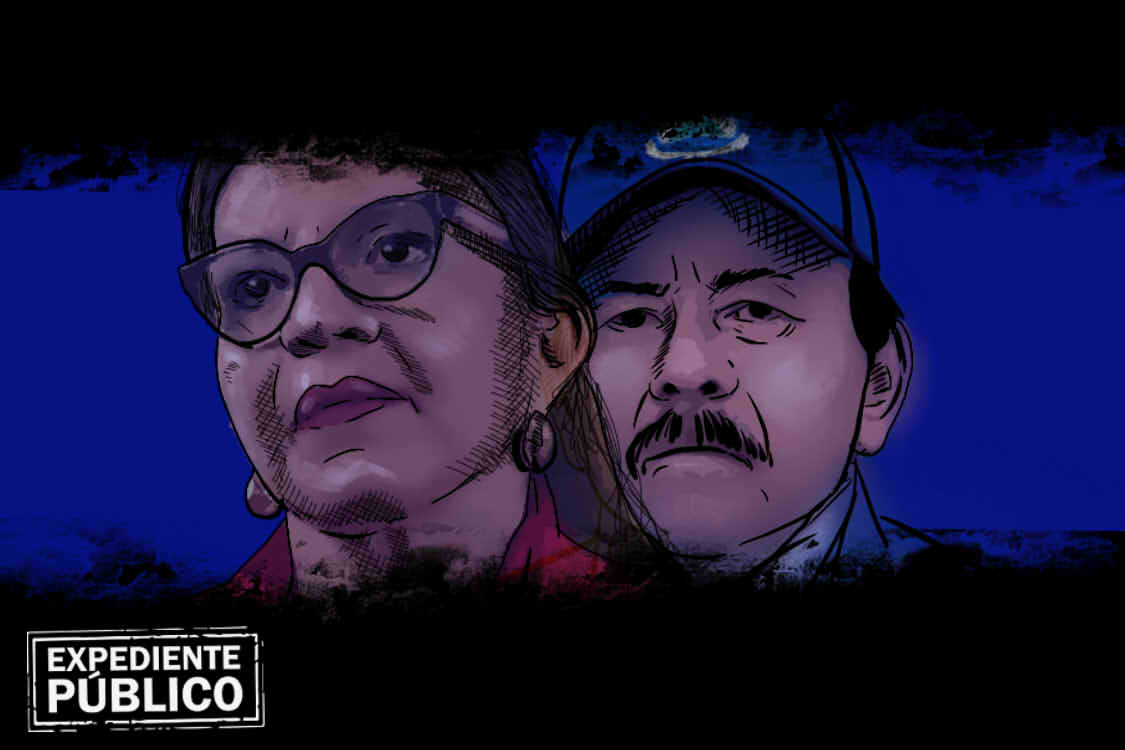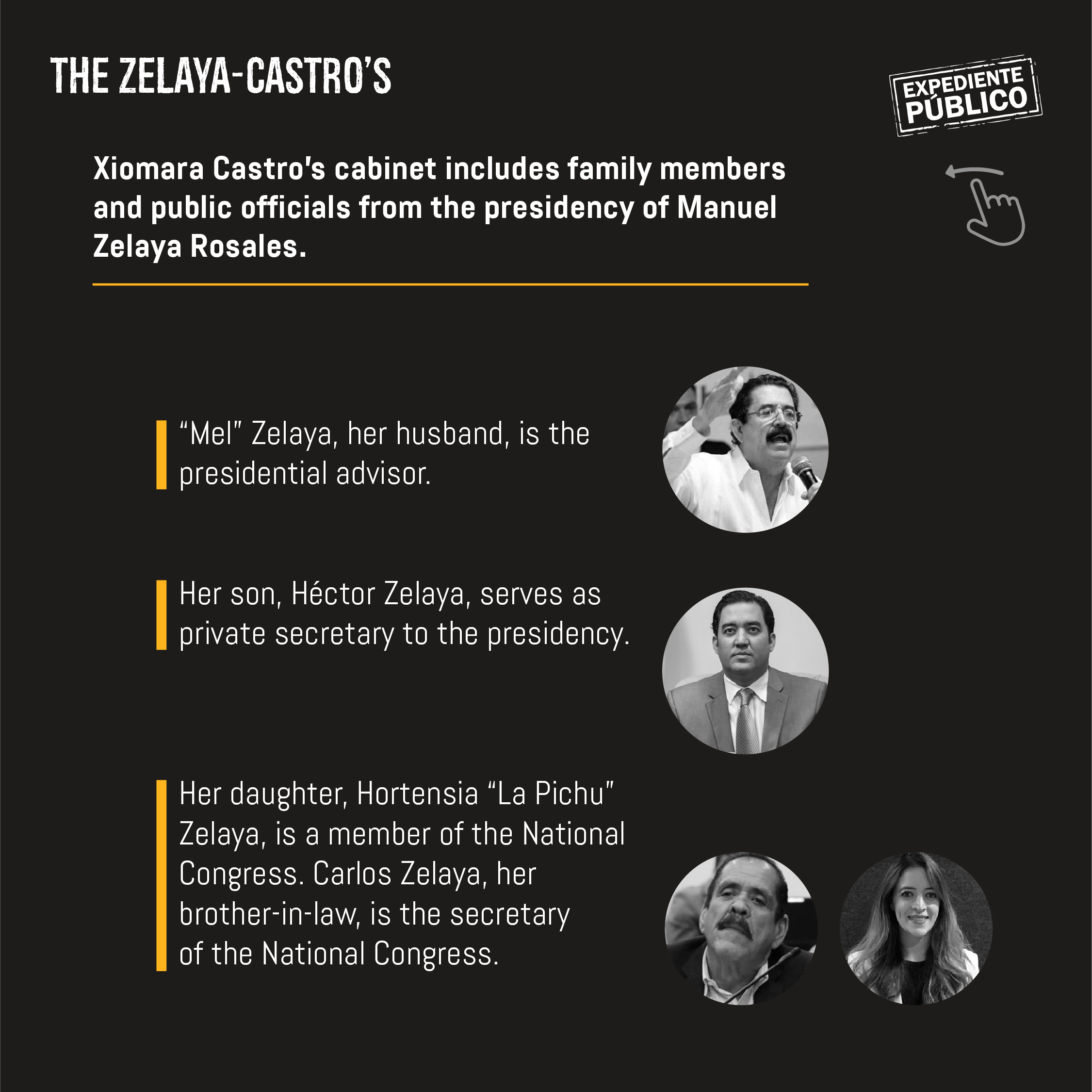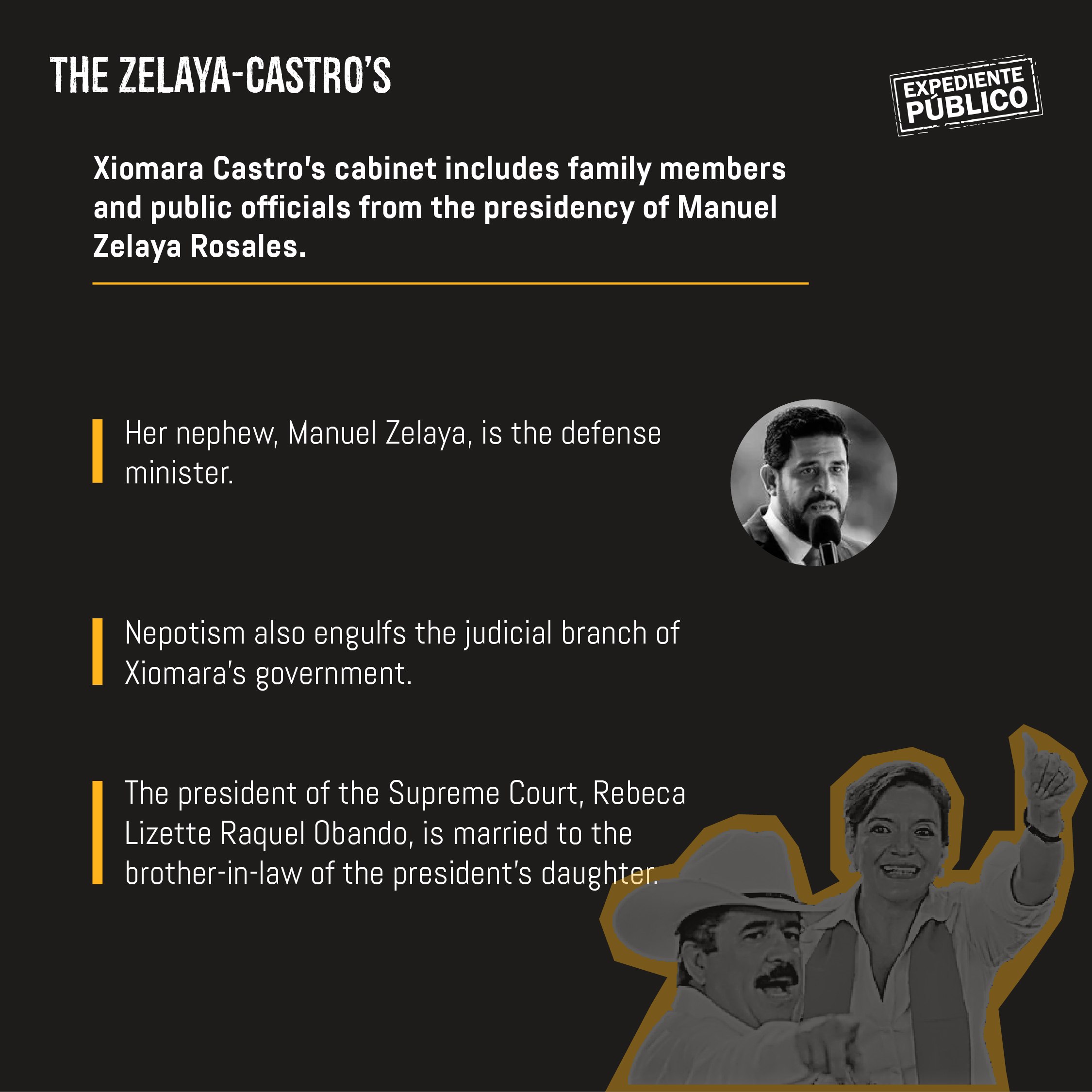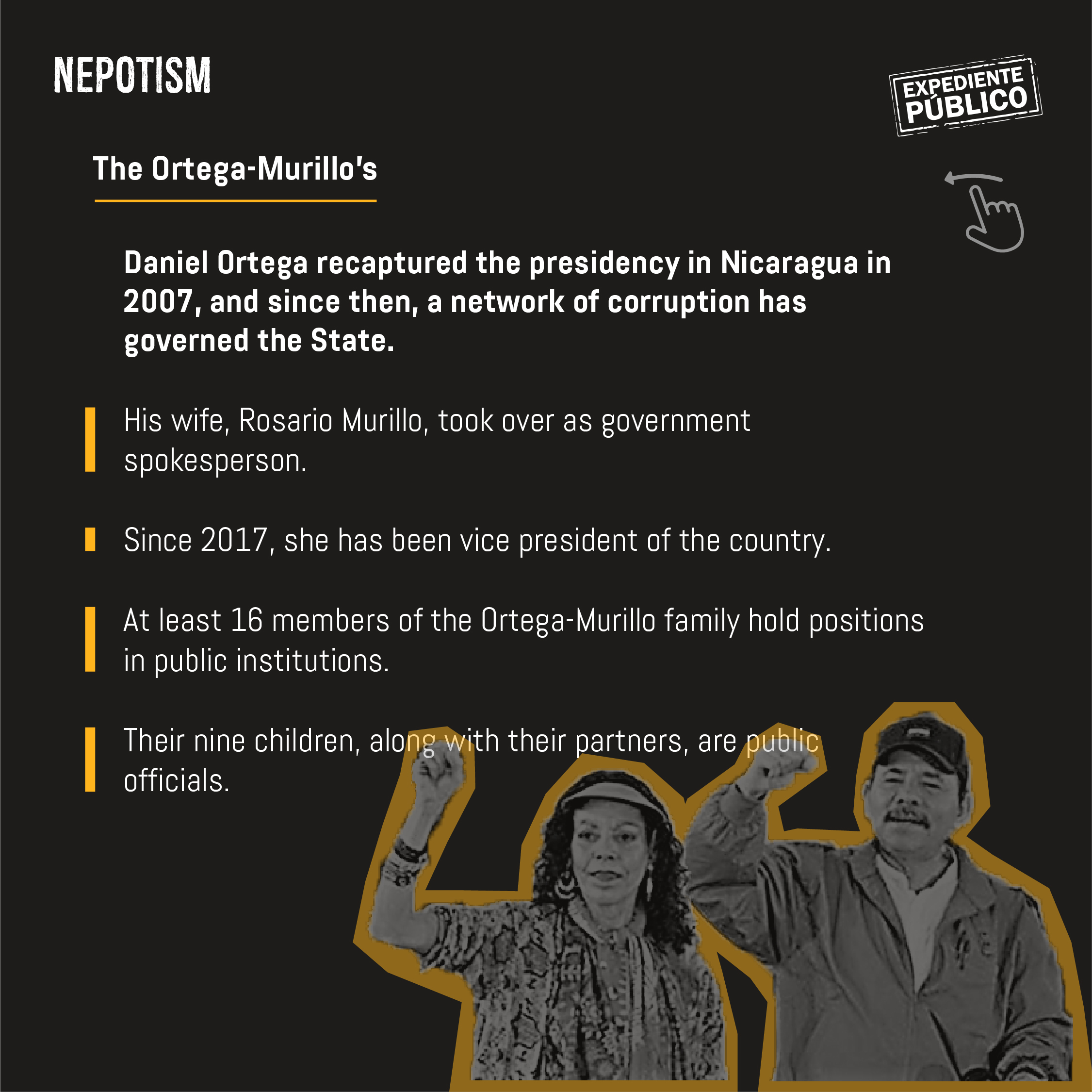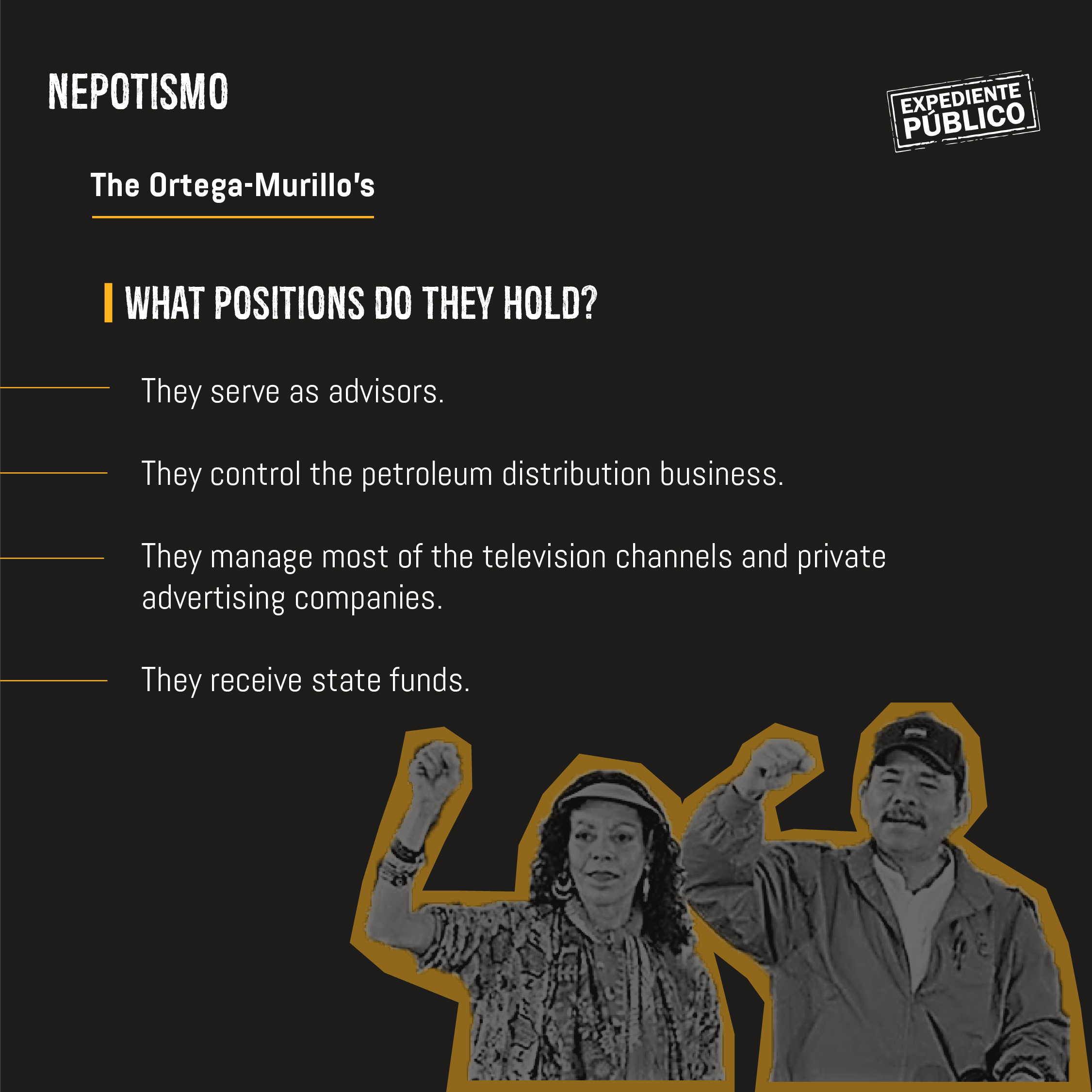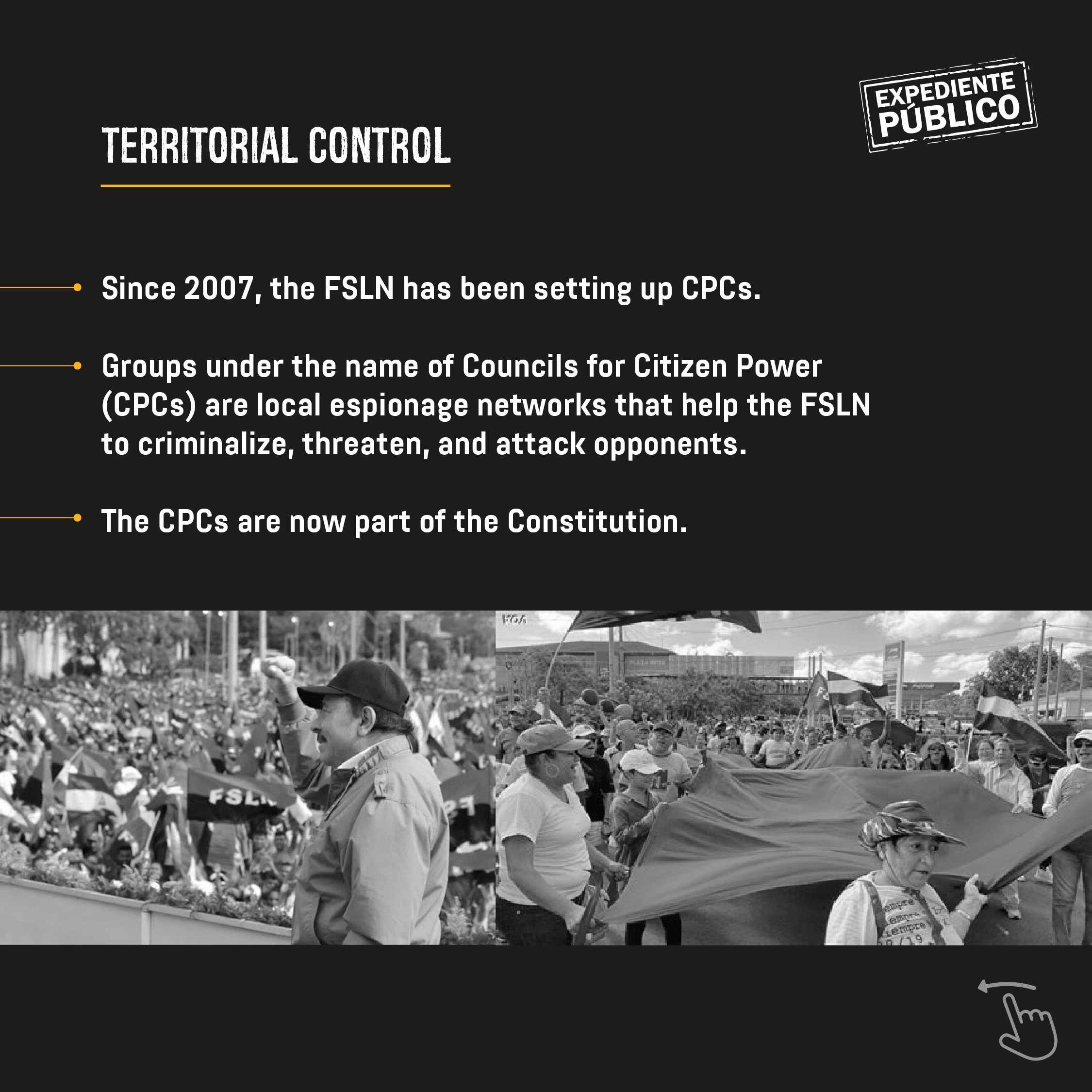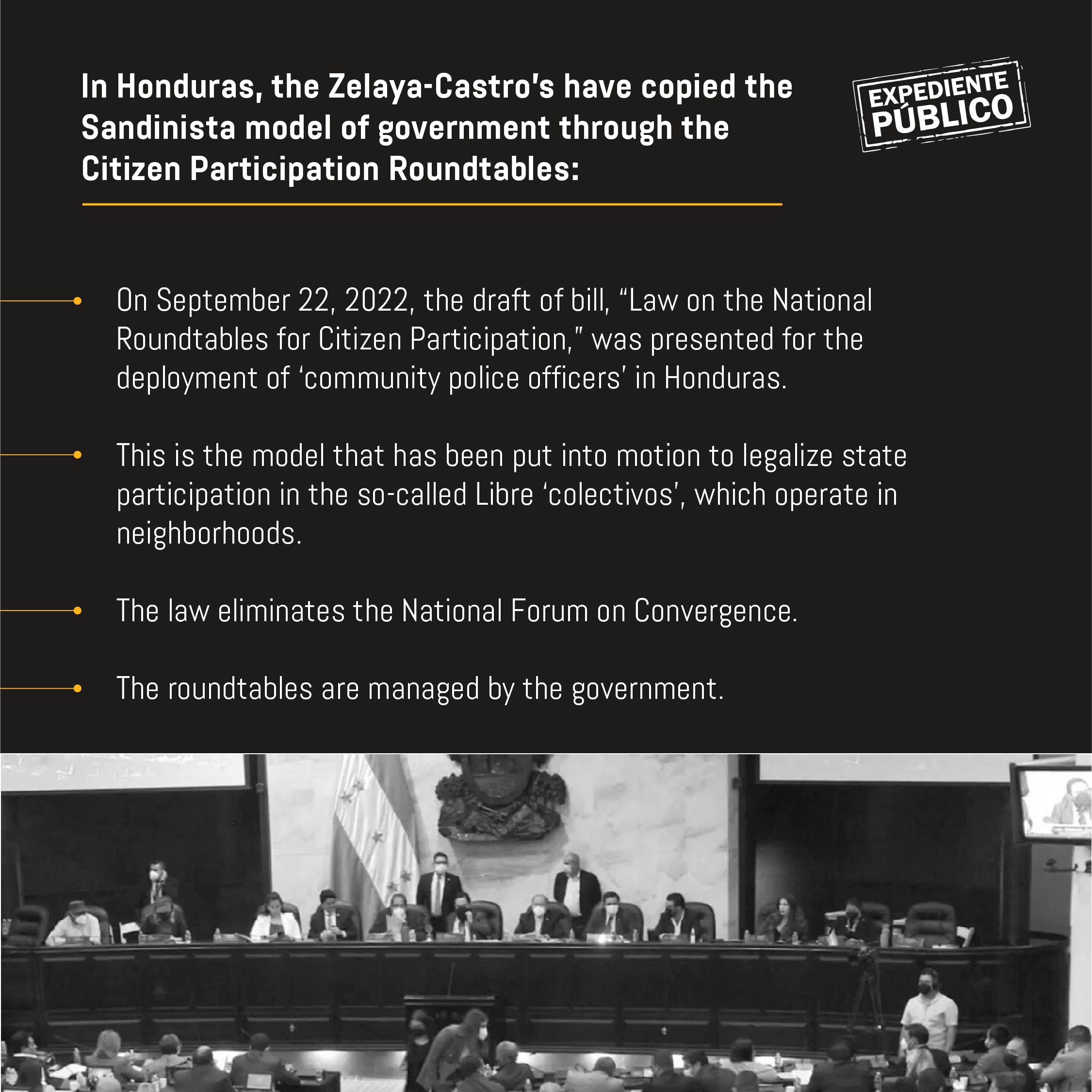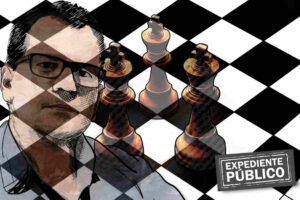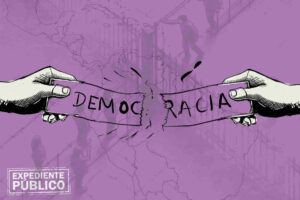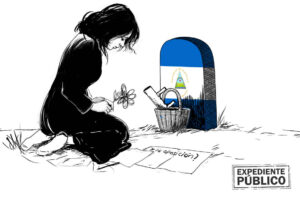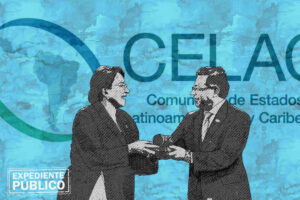*The similarities between Honduras and Nicaragua are more and more clear each day. The Libre Party now oversees the executive branch and the Supreme Court of Justice. Within the National Congress, there are manifestations of alignment with the government. In Nicaragua, all the government branches respond to the interests of the Sandinista regime.
**In addition to sharing the style of family governance with Nicaragua, the Castro-Zelaya’s also are developing Citizen Participation Roundtables, which mirror the Councils for Citizen Power (CPCs) in Nicaragua, Venezuela, and Cuba that are used to repress opponents.
Yarely Madrid / Expediente Público
Having been president of Honduras for just one year to date, Xiomara Castro is already showing tendencies of authoritarian rule, nepotism, political clientelism, and cooptation of different government branches, which are characteristic of the regime in Nicaragua under the rule of President Daniel Ortega and his wife Rosario Murillo.
The Castro-Zelaya family is scattered throughout important federal positions, the National Congress, and the Supreme Court of Justice (CSJ in Spanish), a strategy that Ortega used with his family in Nicaragua to form a network that guaranteed him power and absolute control of the country.
Citizen Roundtables and the CPCs
The Government’s Liberty and Reformation Party (Libre in Spanish) seems to be copying the Sandinista model for the Citizen Power Councils (CPCs) through its adoption of the Citizen Participation Roundtables, a model to legalize state participation in ‘colectivos’ or community groups. In Nicaragua, these groups function as local intelligence networks that serve to threaten and criminalize those who oppose the Ortega regime.
During the protests prior to April 2018, these CPCs were used as shock and paramilitary groups that, supported by the police and the army, attacked civilians using firearms, causing the death of at least 355 people. In the following months, another four thousand people suffered from injuries by firearms in different parts of the Central American country, according to reports from international human rights organizations.
In Honduras, as previously mentioned, these groups have legalized the state participation of the ‘colectivos’ of the Libre Party, which operate in neighborhoods around the country. What causes citizen distrust is that these Citizen Participation Roundtables are led by the government. In Nicaragua, these groups are used to attack, accost, gather intelligence, criminalize, and incarcerate opponents.
Moreover, Castro has been heavily criticized for governing under the shadow of her husband and presidential advisor, Manuel Zelaya Rosales, who has several powers that border unconstitutionality.
Continue reading: El gabinete de Xiomara Castro, del nepotismo al clientelismo político
The power of “Mel” Zelaya
Castro’s candidacy for the presidency came to fruition in 2013 after her husband, “Mel” Zelaya suffered from a coup d’état in 2009 that sought to encourage reelection through a popular referendum.
In 2017, she created an alliance with the then Anti-Corruption Party (PAC in Spanish), which was led by Salvador Nasralla, who would be the presidential candidate based on a mutual agreement. But former President Juan Orlando Hernández won for the second time in an election that lacked constitutionality.
When Hernández’s last presidential term came around, the National Party had been in power in Honduras for 12 years, but the serious cases of corruption that the country faced during the COVID-19 pandemic and the international scandals in the media that tied the former president to narcotrafficking made the Honduran population lose confidence in the government, and in the 2021 elections against Nasry Asfura, Castro, in alliance again with Salvador Nasralla, won the presidential election with 51.12% of the votes.
Prior to Castro’s electoral victory, her husband Zelaya stood in her shadow making decisions internally for the Libre Party.
The husbands govern
Now, as president, the current presidential advisor has several powers that border unconstitutionality. For example, in February of 2023, Castro traveled to Spain to visit the King of Spain Felipe VI and the President of Spain Pedro Sánchez.
A media outlet leaked a recording in which President Castro delegated Zelaya to meet with five cabinet members to revise “work goals.”
Article 242 of the Constitution establishes that, in the temporary absence of the president, one of the three presidential delegates should substitute him or her.
One of the presidential delegates, Nasralla, told the media that most of these meetings are led by “Mel” because “he does not what other people to know what they are working on” or the type of “ideology that they want to put in place.”
Moreover, the presidential advisor has been seen in decisive meetings for Honduras, such as the first meeting of the Government with the National Council on Defense and Security (CNDS in Spanish).
Rosario Murillo and her power in Nicaragua
In Nicaragua on the other hand, Ortega and his wife Murillo govern the country. Since the Nicaraguan president rose to power in 2007, his wife has taken over government responsibilities, becoming the vice president-elect in 2017 and in Ortega’s shadow, the leader of the Sandinista National Liberation Front (FSLN in Spanish).
Ortega does not hesitate to confirm that 50% of the presidency corresponds to himself and 50% is left up to his wife. He expressed this on national news, adding that “more than a vice president, she (Murillo) takes on functions of the presidency because what we have here is a co-presidency.”
“We will have to reform the Constitution so that the principles of a co-presidency are formally established,” said Ortega in an official decree on February 9 after discussing the liberation and expulsion of 222 political prisoners to the United States who were illegally detained by the Nicaraguan government for three years.
Nothing gets done in Nicaragua without Murillo giving her consent. She handles the day-to-day government tasks and controls the ministries, mayorships, and executive branch’s agenda. Those who decide to disobey her are immediately relieved of their duties and treated like traitors publicly.
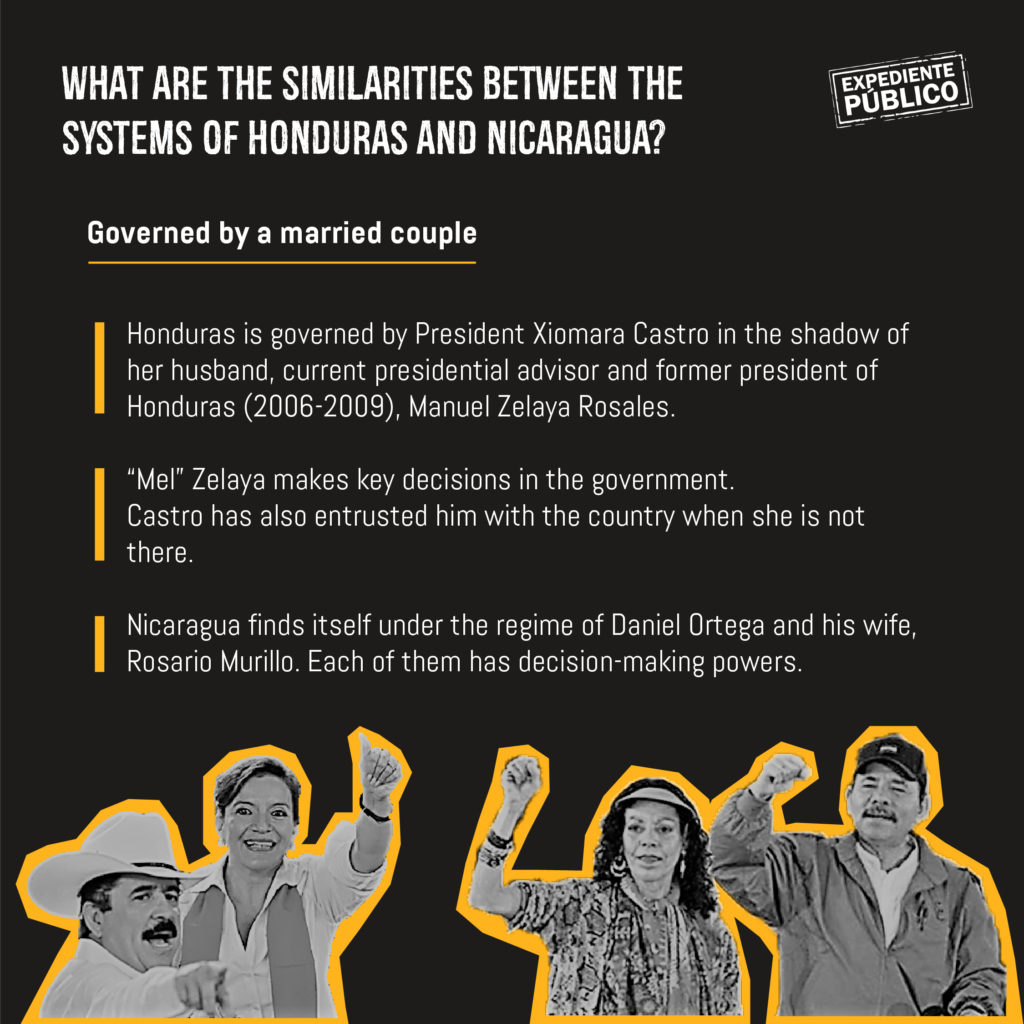
Read: Las mesas de participación ciudadana de Xiomara Castro
Nepotism and clientelism
After coming to power on January 27, 2022, Xiomara Castro nominated her cabinet members who were different family members and political friends who historically had been loyal to the Castro Zelaya’s and even served during the “Mel” presidency.
In addition to Castro’s husband who is her presidential advisor, her brother-in-law, Carlos Zelaya is the secretary of the National Congress and her daughter, Xiomara Hortensia Zelaya is a member of Congress.
One of her other children, Héctor Zelaya serves as private secretary to the presidency but also is essentially her faithful companion on diplomatic tours to various countries.
Another key position is that of the minister of defense, which José Manuel Zelaya, her nephew, holds.
In total, the Castro cabinet is formed of 35 Libre Party members, two Savior Party of Honduras members (PSH in Spanish), one Liberal Party member, one Honduras Humana Party member, and another individual without political affiliation.
Why is control of the Supreme Court convenient?
The last key nomination for the Libre Party was to the Supreme Court of Justice (CSJ in Spanish). Amid irregularities in the early hours of February 17, Rebecca Lizette was named president of the CSJ. In addition to being a supporter of the governing party, Lizette has a history of money laundering and her daughter has been linked to Juan Matta-Ballesteros, a former Honduran drug lord with ties to the Medellín Cartel who is currently detained in the United States.
Moreover, Lizette’s husband, José Luis Melara Murillo is the uncle of Castro’s oldest daughter, Zoé Zelaya.
In Nicaragua, the presidential couple began to weave a familial network of over 16 individuals into key government positions.
For example, Ortega and Murillo’s nine children and six of their partners are government officials who control the distribution of petroleum, lead most of the television channels and private commercial companies, and receive state funds. Camila Ortega Murillo is the main figure in the regime’s public events, while Laureano Ortega takes on the role of secretary of state, among other roles, such as the key negotiator in negotiations with China and Russia.
Also: Nueva Corte Suprema de Justicia de Honduras ya es señalada de ilegalidades
Absolute control of the branches of government
The director of the Netherlands Institute for Multiparty Democracy (NIMD) in Honduras, Luis León, explained to Expediente Público that “during the last 15 to 20 years, Honduras has functioned around the concentration of powers.”
A clear example of this situation is former President Juan Orlando Hernández’s reelection in 2017, which was possible through the control of all state institutions.
León explained that this phenomenon is also occurring in Nicaragua and is “what has [Honduras] in the situation in which it finds itself, even though [the country] has been slower to make the transition to political control.”
However, the issue for both Central American governments is that Ortega and Castro marketed themselves to their respective populations as liberators under the promise of being different in their respective runs for the presidency.
In the case of Castro, she won elections under the promise that her presidency would be different from that of the National Party. In the case of Daniel Ortega, he ran on the campaign that he was the leader who helped to topple the Somoza dictatorship that greatly harmed the Nicaraguan population over a period of 40 years.
In Honduras, the Castro-Zelaya family has control over the executive and judicial branches through the CSJ. In the case of the legislature, former President Zelaya, together with his brother, lead all negotiations.
The Board of Directors of the National Congress is presided over by Luis Redondo, a loyal ally of the Castro-Zelaya government. Additionally, the vice minister of the National Congress is Rasel Tomé, historically a follower of the Libre Party, and “Mel” Zelaya’s brother, Carlos Zelaya, is the secretary of the legislative entity.
What is happening to the National Congress?
Even though the Libre Party only has 50 congressional members who do not even reach a simple majority of 65 votes to make decisions, it can approve laws that favor the party through negotiations with the National Party (44 votes) and the Liberal Party (22 votes).
The Libre Party dominates the congressional board with seven of its nine deputies, where the presidency is also key, which, although presided by Luis Redondo, elected on the PSH ticket, now openly responds to President Castro and favors the ruling party’s agenda.
The legislative secretariats are occupied by all Libre Party deputies, including the brother of the former president, Carlos Zelaya, which is why only the laws that favor the government become priorities. Another sign that the legislative branch is aligned with the interests of the Castro-Zelaya’s is that the deputies of the Liberal Party vote with the ruling party, and if they continue to do so, they will have 82 congressional votes.
Whoever controls the Court wields political power
The CSJ, in addition to being headed by Rebecca Lizette, who is close to the Castro-Zelaya family, is distributed in a strategic way. The Libre Party has six magistrates (majority), the Liberal Party has four, with one of them, Milton Jiménez, being close to former President “Mel” Zelaya, and the National Party has five. With Jiménez, the government could have control over this branch of the State.
Likewise, bypassing the Constitution, six substitute magistrates were elected (two Libre members, two Nationals, and two Liberals) whose function is to substitute the magistrates in the different chambers.
This may serve as a future move on judicial decisions. For example, the Constitutional Chamber is made up of two magistrates of the Libre Party, one of the Liberal Party, and two Nationals. If one of the National Party members is absent, one of the Libre Party members could replace him or her to have a majority.
Is the Castro-Zelaya’s concentration of power worrisome?
Edgar Gutiérrez Aiza, a doctoral candidate at the University of Oxford in England, explained to Expediente Público that the problem with the country’s concentration of power “is that it is combined with the Cortes family’s occupation, which is a red flag as well.”
Another valid point for Úrsula Indacochea, president of the program on the Independent Judiciary at the Due Process of Law Foundation, indicated to Expediente Público that the alarms sound not only due to “family or clan ties to positions within the executive branch or positions of trust” but also because “other branches of government are involved.”
According to Elvira Cuadra, a Nicaraguan sociologist, when “Daniel Ortega returned to the presidency, he already had a strong grip on those two government branches.”
Following the corruption accusations surrounding Liberal Party leader, Arnoldo Alemán, for diverting donations for those affected by Hurricane Mitch, which affected Nicaragua in 1998, Ortega signed an agreement of impunity in which the Sandinistas and the Liberals divided up the magistrate seats in the Supreme Court and the Supreme Electoral Council (CSE), which allowed them to reform the Electoral Law and paved the way for Ortega to win the 2006 presidential elections.
How did the Ortega-Murillo family rise to power?
Cuadra explained that Ortega did not initially have the “National Assembly under his control, as it was divided into different camps where there was still a political opposition.”
But there was a critical moment during the 2011 elections when Ortega openly contravened what was in the Constitution, which prohibited presidential reelection. “Ortega presented his candidacy to the Supreme Electoral Court, which was under his control and allowed him to run for president.”
Read: La política exterior de Xiomara Castro y su “doble rasero” al apoyar a regímenes autoritarios
The key, in this case, was the Constitutional Chamber of the Supreme Court’s (controlled by the Sandinistas) decision that declared the prohibition of continuous presidential reelection inapplicable.
The sociologist stated that from there, Ortega won a parliamentary majority, which allowed him to reform the Constitution several times, including the 2013 reforms, which consisted of the elimination of Article 147, which had to do with presidential reelection.
Perpetrating power
“Changes in certain elements allowed Ortega to reinforce his alliance with the private sector and also have the possibility of achieving greater control over the army and the police, which have been two key institutions for him as time has gone on,” said Elvira.
“Ortega has very much created a total power system over all public institutions, and when I say all of them, I mean the other branches of government,” she regretfully added.
Even though Honduras and Nicaragua have similarities, Cuadra believes that their political processes are different and that “they have something to do with what is occurring across all of Central America, which is an authoritarian shift.”
Ortega was reelected in 2021 for the fifth time overall and the fourth consecutive time, in elections described as fraudulent and lacking in transparency, particularly since there was no electoral observation. Ortega imprisoned all presidential pre-candidates, shut down media outlets and civil society organizations, and prosecuted anyone who criticized him.

